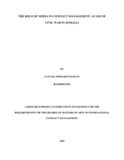| dc.description.abstract | This study focuses on the media in Somalia, looking at how the press – mainly radio – is used in conflict management while at the same time assessing the positive and negative impacts the media has on the prolonged Somalia conflict. The thesis also looks at the challenges faced by the journalists and their media houses in respect to the conflict in the war torn horn of Africa nation. Special attention is given to the de-escalation approach used by media operating in Somalia to mitigate the impact and spread of conflict. The study focuses on the years when the country’s conflict was at its peak, especially during the era of warlords, moderate Islamist, extremists such as Al-Shabab and the Federal government. The study pursued to evaluate possible expressions of peace journalism against war journalism by using tools unique to conflict analysis. The study used secondary sources of data, this includes; several media houses websites and reporters operating in Somalia, as well as other researchers works on Somali conflict. The study used the frameworks of peace and war journalism to analyze the impact of media reports has had on the conflict in Somalia, and the result shows that even though both local and international media houses tend to use more of war journalism than peace journalism, some local stations in the country have championed peace journalism and actually helped calm tensions in different parts of Somalia. The research also found that radio station is the most preferable source of media in Somalia; since most people are not literate they do not depend on newspaper. The study further revealed that several media faced various challenges from Somali government, the former Islamic Courts Union (ICU), extremist groups such as Alshabab, and the local administrations such as Puntland, which in several cases had threaten journalist and some have gone further to arrest them. | en_US |



